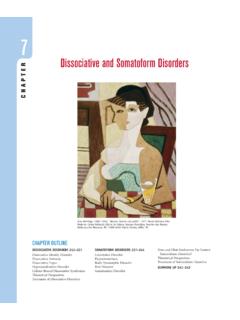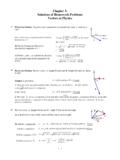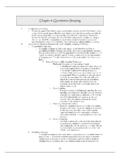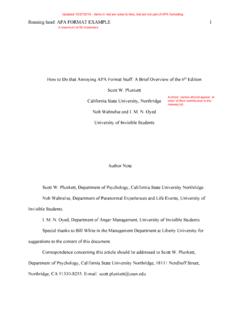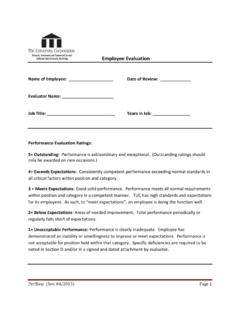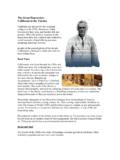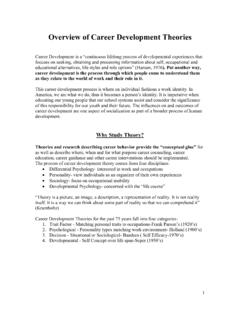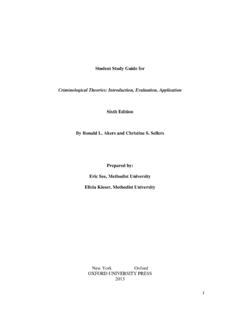Transcription of Chapter 1: The Sociological Perspective - California State …
1 1 | Page Chapter 1: The Sociological Perspective Chapter Summary Sociology offers a Perspective , a view of the world. The Sociological Perspective opens a window into unfamiliar worlds and offers a fresh look at familiar worlds. Sociologists study the broader social contexts that underlie human behavior. These include the social groups that influence human behavior and the larger society that organizes it. The Sociological Perspective is an approach to understanding human behavior by placing it within its broader social context. C. Wright Mills referred to the Sociological Perspective as the intersection of biography (the individual) and history (social factors that influence the individual). Sociology is one of several disciplines referred to as a social science.
2 As the term implies, social sciences address the social world. The natural sciences, on the other hand, are the intellectual and academic disciplines designed to explain and predict the events in the natural environment. The other social sciences include anthropology, economics, political science, and psychology. As a scientific discipline, sociology seeks to explain why something happens, attempts to make generalizations that can be applied to a broader group or situation, and predicts what will happen based on the knowledge received. Sociology specifically seeks to explain the causes of human behavior and to recognize the patterns of human behavior. It also seeks to predict the future behavior of people. Although sociologists usually do not make decisions on how society should be changed or people treated, sociologists provide valuable research data that can be used by authorities who do make such decisions.
3 Sociology grew out of the social, political, economic, and technological revolutions of the eighteenth and nineteenth centuries. The Industrial Revolution, in particular, eroded old traditions and necessitated new ways of perceiving and examining the social world. With the success of the natural sciences serving as a model for the social sciences, sociology emerged in Western Europe as a distinct discipline in the mid-1800s. Auguste Comte, Herbert Spencer, Karl Marx, Emile Durkheim, and Max Weber were early thinkers in the development of sociology. The idea of applying the scientific method to the social world, known as positivism, was first proposed by Auguste Comte. Based on this innovation and Comte s effort to apply the scientific method to social life, he is credited as being the founder of sociology.
4 Herbert Spencer, one of the most dominant and influential English sociologists, is often called the second founder of sociology. Spencer s concept of Social Darwinism suggested that societies evolve from primitive to civilized and that the fittest societies evolve and survive, while unfit societies become extinct. Max Weber advocated Verstehen, the German term for grasp by insight, to understanding why people act as they do. In contrast, Emile Durkheim believed that sociologists should focus primarily on uncovering social facts the objective social conditions that influence people s behaviors. Verstehen and social facts are not mutually exclusive types of social research. Contemporary sociologists often employ both approaches to examine and understand the social contexts that underlie human behavior.
5 The early history of sociology in North America was characterized by a debate over whether sociology should analyze or reform society. Early sociology programs were initiated at the University of Kansas in 1890, the University of Chicago in 1892, and Atlanta University in 1897. Albion Small, George Herbert Mead, Robert E. Park, and Ernest Burgess were among the first academicians to dedicate their professional careers to the 2 | Page development of Sociological theory. DuBois, the first African American to earn a doctorate from Harvard University, was a social critic and dedicated his life to analyzing and writing about social injustice. During the 1940s, the emphasis in American sociology shifted from social reform to social theory.
6 Grand theorists, such as Talcott Parsons, developed detailed, abstract models of how the complex parts of society harmoniously functioned together. Although this helped to legitimize sociology as a science, it did little to critique, reform, and/or help to change the social injustices in society. C. Wright Mills influential analysis of the power elite a small group of business, political, and military leaders whose monopoly on power threatens freedom helped to shift sociology back toward social reform in the 1960s and 1970s. Many sociologists continue to disagree over the proper uses of social research. Some sociologists practice basic (or pure) sociology, while others practice applied sociology. Whether one practices basic or applied sociology, a primary goal of social research is to separate fact from fiction, while examining the links between what people do and the social settings that help shape their behavior.
7 The current State of sociology encompasses social analysis and social reform, with a growing emphasis on applied sociology a sort of middle ground that, rather than focusing on large and/or radical social change, uses Sociological analysis to help solve problems in a specific setting. Central to the study of any science is the development of theory. A theory is a general statement about how parts of the world fit together, relate to one another, and affect each other. Sociologists use three major theories symbolic interactionism, functional analysis, and conflict theory to observe and interpret social contexts, relationships, and realities in distinct ways. Symbolic interactionism analyzes how people use symbols to develop and share their view of the world.
8 Focusing on the micro level, it studies the different ways that individuals and small groups create, disseminate, and/or interpret reality through their everyday, face-to-face interactions. Functional analysis examines how the various parts of society work together to fulfill their respective functions and, consequently, create a harmonious society. Focusing on the macro level, it also looks at how parts of society occasionally dysfunction, negatively affecting other parts of society and, consequently, contributing to a more unstable society. Conflict theory views the social world in terms of competing groups struggling over scarce resources. Also focusing on the macro level, conflict theory examines how groups of people with power maintain and/or impose their power, and how groups of people without power work to acquire power.
9 In an effort to pursue a social reform agenda, the American Sociological Association is now promoting public sociology with the goal of influencing politicians, public officials, and policy makers. As the world becomes more globally connected, American sociology is likely to expand its current horizons: incorporating new perspectives and worldviews that include and encompass global issues and concerns. Chapter Outline I. The Sociological Perspective A. This Perspective is important because it provides a different way of looking at familiar worlds. It allows us to gain a new vision of social life. B. This Perspective stresses the broader social context of behavior by looking at individuals social location employment, income, education, gender, age, and race and by considering external influences people s experiences which are internalized and become part of a person s thinking and motivations.
10 We are able to see the links between what people do and the social settings that shape their behavior. C. This Perspective enables us to analyze and understand both the forces that contribute to the emergence and growth of the global village and our unique experiences in our own smaller corners of this village. 3 | Page II. Sociology and the Other Sciences A. Science is the systematic methods used to obtain knowledge and the knowledge obtained by those methods. It can be divided into the natural sciences and the social sciences. Sociology is defined as the scientific study of society and human behavior. B. The natural sciences attempt to comprehend, explain, and predict events in our natural environment. C. Social sciences attempt to objectively study the social world.

